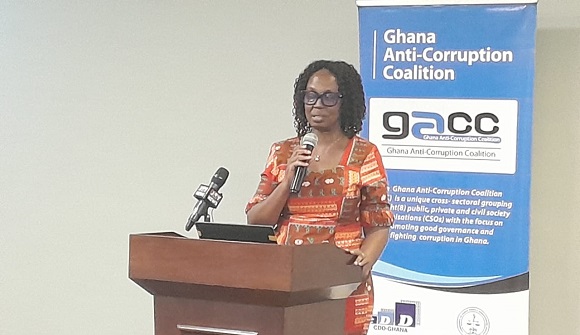Beauty Emefa Narteh, Executive Secretary of the Ghana Anti-Corruption Coalition, has underscored the urgent need for Ghana to establish a robust framework to regulate conflicts of interest, a move she believes is critical for enhancing governance and curbing corruption.
While distinguishing conflict of interest from outright corruption, Ms Narteh highlighted its potential to create vulnerabilities and foster corrupt practices, particularly within procurement processes.
She advocates for a comprehensive instrument dedicated to conflict of interest, aimed at educating citizens about its nuances.
“Conflict of interest does not equate to corruption, but it places individuals in a precarious position where corrupt actions become more likely,” she explained. This framework, she argues, would help mitigate the risks associated with conflicts of interest and address the perceptions of corruption that can undermine trust in public institutions.
She further emphasized the role of the Commission on Human Rights and Administrative Justice (CHRAJ) in leading educational initiatives for public officeholders. Given the complexity and ambiguity surrounding conflict of interest, Ms Narteh believes that targeted education is essential to prevent public officials from inadvertently falling afoul of ethical guidelines.
Moreover, Ms Narteh called on public officials to uphold the integrity of their offices, warning against the temptation to exploit their positions for personal enrichment.
“When working in public positions, officeholders should need to understand that they should have the interests of the public at heart. People should not come to public office to abuse the office and enrich themselves,” she noted.
Ms Narteh made the assertions speaking on the NorvanReports and Economic Governance Platform (EGP) X Space on the topic, “Corporate Governance and Conflict of Interest: The Case of SSNIT’s Sale of Assets”.
Speaking on the issue of the SSNIT 60% shares sale to Rock City owned by Agriculture Minister Bryan Acheampong, Ms Narteh noted SSNIT missed an opportunity to be transparent and accountable to Ghanaians and its contributors.
The debate over SSNIT’s decision to sell its shares to Rock City owned by the Agric Minister started when the North Tongu MP, Samuel Okudzeto Ablakwa lodged a formal petition with the Commission on Human Rights and Administrative Justice (CHRAJ) to investigate allegations surrounding the sale of six hotels to Rock City Hotel owned by Bryan Acheampong.
The hotels under scrutiny in the petition include Labadi Beach Hotel, La Palm Royal Beach Resort, Elmina Beach Resort, Ridge Royal Hotel, Busua Beach Resort, and the Trust Lodge Hotel.
Mr Ablakwa’s petition to CHRAJ seeks an investigation into various allegations, including conflict of interest, abuse of power, lack of due process, procurement breaches, cronyism, and graft.
Norvanreports





